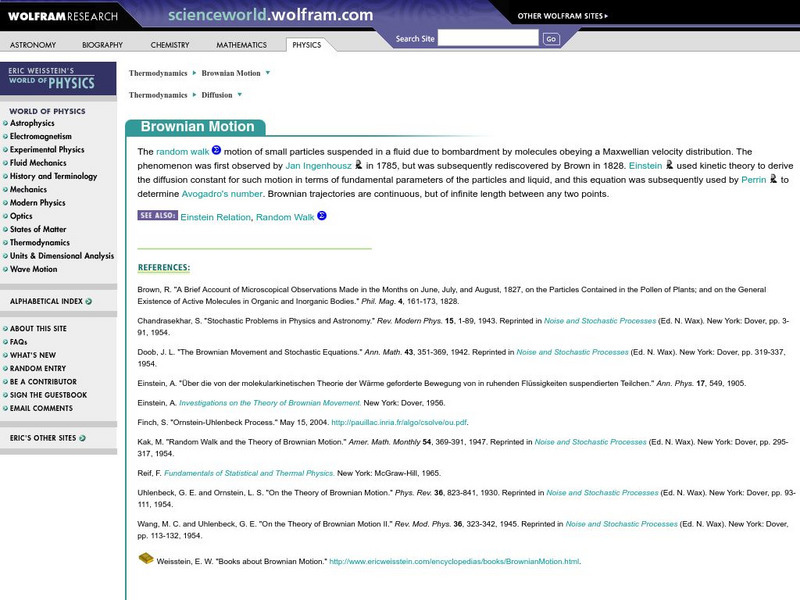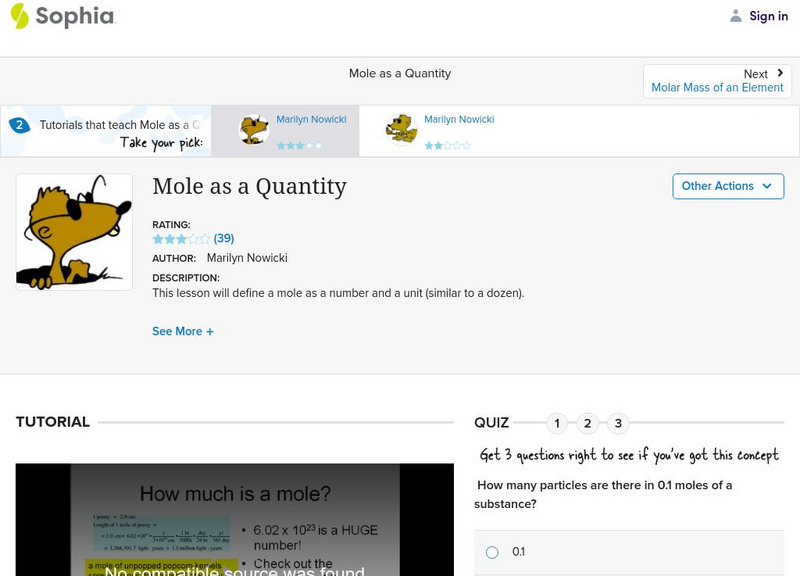Wolfram Research
Wolfram Science World: Brownian Motion
This site from ScienceWorld gives a brief description of Brownian motion. It also goes on with a detailed series of formula derivations utilizing calculus. Links to related topics and definitions are given.
Simon Fraser University
Chem1 Virtual Textbook: Moles and Their Uses
As part of the "Basic Atomics" section of the Virtual Textbook, this site examines moles. The information presented defines moles in relation to Avogadro's number and then goes on to describe molar mass and molar volume.
Other
Chris Johnson: Amedeo Avogadro
This site deals with Amedeo Avogadro, his life, his contributions to chemistry, and his famous number.
Iowa State University
Iowa State University: Argument for Scientific Realism
This page from Iowa State University describes the various experimental ways that Avogadro's number has been determined.
Other
Lock Haven: Glossary of Frequently Misused or Misunderstood Physics Terms
A page, written by Donald E. Simanek of Lock Haven University discusses misused and misunderstood physics terms and concepts. It reminds us that Avogadro's number is a constant, and should be treated as such.
Sophia Learning
Sophia: Converting From Grams to Particles: Lesson 2
This lesson demonstrates how to convert from grams to particles (molecules, atoms, ion). It is 2 of 2 in the series titled "Converting from Grams to Particles."
Nobel Media AB
The Nobel Prize: Jean Baptiste Perrin Nobel Lecture
At this site from The Nobel Foundation you can read Jean Baptiste Perrin's Nobel Lecture, "Discontinuous structure of matter," in which Perrin overviews the work which earned him the Nobel Prize in Physics.
Sophia Learning
Sophia: Converting From Particles to Moles
A guided slide show presentation illustrating how to convert from particles to moles.
Sophia Learning
Sophia: Mole as a Quantity
Learn how to define a mole as a number, and estimate the size of a mole of some common objects. [3:18]
Texas Education Agency
Texas Gateway: Temperature, Kinetic Theory, and the Gas Laws: Glossary
This is a glossary of terms and definitions used in Chapter 13: Temperature, Kinetic Theory, and the Gas Laws from the AP Physics online text.
Chiral Publishing
Chiral Publishing: An Introduction to Chemistry: Relating Mass to Number of Particles: Audio Book
This slide and audio book shows how to relate mass to a number of particles by using many formulas, examples, and real life scenarios. View the weighted average calculations, Avogadro's number, the atomic mass of carbon, and molar mass.
CK-12 Foundation
Ck 12: Chemistry Simulation: Mole Carnival
[Free Registration/Login Required] In the mole carnival, students count the number of atoms and particles in different objects found at the carnival. As students work to find the number of particles, they practice counting particles by...
Cosmo Learning
Cosmo Learning: Junior Chemistry With Chemguy
A collection of video lectures to teach junior high students topics in chemistry. Lectures cover topics in understanding the periodic table, compounds, chemical bonding, Avogadro's number, balancing chemical equations, stoichiometry,...
Sophia Learning
Sophia: Mole as a Quantity: Lesson 2
This lesson will define a mole as a number and a unit (similar to a dozen). It is 2 of 2 in the series titled "Mole as a Quantity."
Sophia Learning
Sophia: Converting From Moles to Particles: Lesson 2
This lesson demonstrates how to convert from moles to particles (molecules, atoms, ion). It is 2 of 2 in the series titled "Converting from Moles to Particles."













